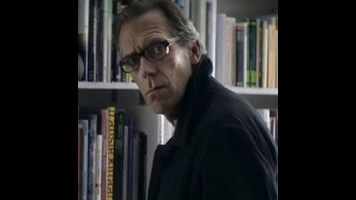At first glance, Eldon Chance is a peculiar choice for the kind of everyman who stumbles upon a world of intrigue in these gritty stories. As a forensic neuropsychiatrist, he regularly crosses the aisle in his practice, alternately serving as an expert witness for the defense and prosecution. So he should probably know better than anyone when he’s getting played. And, as Chance makes abundantly clear to the alluring Jaclyn Blackstone (Gretchen Mol), he’s a consulting physician and not a treating one. That means he’s usually able to keep his distance from his patients—Chance offers a diagnosis and nothing more. But from the moment that Jaclyn first relates her problems, it’s obvious that Chance won’t be able to maintain that professional distance.
The upper-middle-class doctor is also a bit of a rarity in Nunn’s work. The Tapping The Source and The Dogs Of Winter author has previously focused on the kind of sketchy characters who shine when the sun goes down in his stories’ usual Southern California environs. But in place of the usual hunger or downtrodden ideology of Nunn’s characters, Chance has a midlife crisis. He’s in the middle of a divorce, he’s only a weekend father, and he’s grown disillusioned in his work. That last quality is a bit clearer in the book, but Chance does admit to his blacksmith buddy D (Ethan Suplee) that he’s fighting a losing battle, tending to “those mutilated by life.” His work is important, but it’s not enough—not enough to actually heal anyone, and certainly not enough to satisfy him in his middle age.
Portraying a weary medical professional is no new trick for Laurie, and even though Chance is slightly pudgy and obviously balding, the dapper Night Manager star doesn’t lack for charm. But he seems off his game here. Chance’s neuropsychiatry practice isn’t presented anywhere near as dynamically as the various conditions of House’s patients, so Laurie’s gritted-teeth delivery sounds more like a flat affect than the wry observations of the doomed sap of a Dashiell Hammett tale. Laurie’s got an undeniably dignified presence, one he’s proven he can easily distort into something more risible. But Chance mostly swings from denial to confusion, leaving the actor with less material to work with than usual.
Of course, it’s not hard to see what’s got Chance all tied in knots. Mol’s cool blond is in the grand tradition of sexy dames that got away or got some poor soul in over his head. She would fit right in with Alfred Hitchcock’s leading ladies—that, coupled with the San Francisco setting and the web of deceit, inspires comparisons to Vertigo. Instead, Nunn makes his influences plainly known by having Chance actually compare himself to the doomed sap who wooed Marlene Dietrich in The Blue Angel. But the parallels to Josef Von Sternberg’s 1930 classic only extend to the depiction of a collected professional turned besotted fool. Despite having two personalities to play with—from his own source material, no less—Nunn only skims the surface. Mol does a fine job distinguishing between her split personalities Jackie and Jaclyn in her demeanor, but as her actions and motives grow muddled, her intermittent vamping becomes more of an affectation.
Paul Adelstein’s villain hardly registers, even when he’s whaling on the good doctor. That means the only remaining archetype is the “hero’s” guide to the underworld. In this case, it’s a tattooed outsider (Suplee) who says ponderous things about being a “feeder”—i.e., someone who starts shit rather than reacts to it—when he’s not waxing eloquent about the perfect grilled cheese on stakeouts. When Suplee doesn’t take his ex-military, ersatz blacksmith character so seriously, his exchanges with the increasingly impressed Chance are almost charming. But that feeling only lasts until Chance is thrust into yet another unfamiliar, potentially perilous situation—then it’s right back to hamfistedly stringing together metaphors to create a through-line. Leave it to Nunn to leave it to Suplee’s off-the-grid character to spout most of these, instead of Laurie’s neuropsychiatrist or Mol’s STEM professional.
That choice is no real gamble for Nunn, who often turns normally unheard voices into mouthpieces. The problem is that Nunn’s unable to create a coherent drama or compelling thriller, in or out of his milieu. The first half of the season is a jumble of storytelling techniques, despite featuring a slew of top-notch directors, including Room’s Lenny Abrahamson. The source novel was Nunn’s first opportunity to dramatize Chance’s long and steep moral decline, but he stumbles in the execution on the small screen.


 Keep scrolling for more great stories.
Keep scrolling for more great stories.